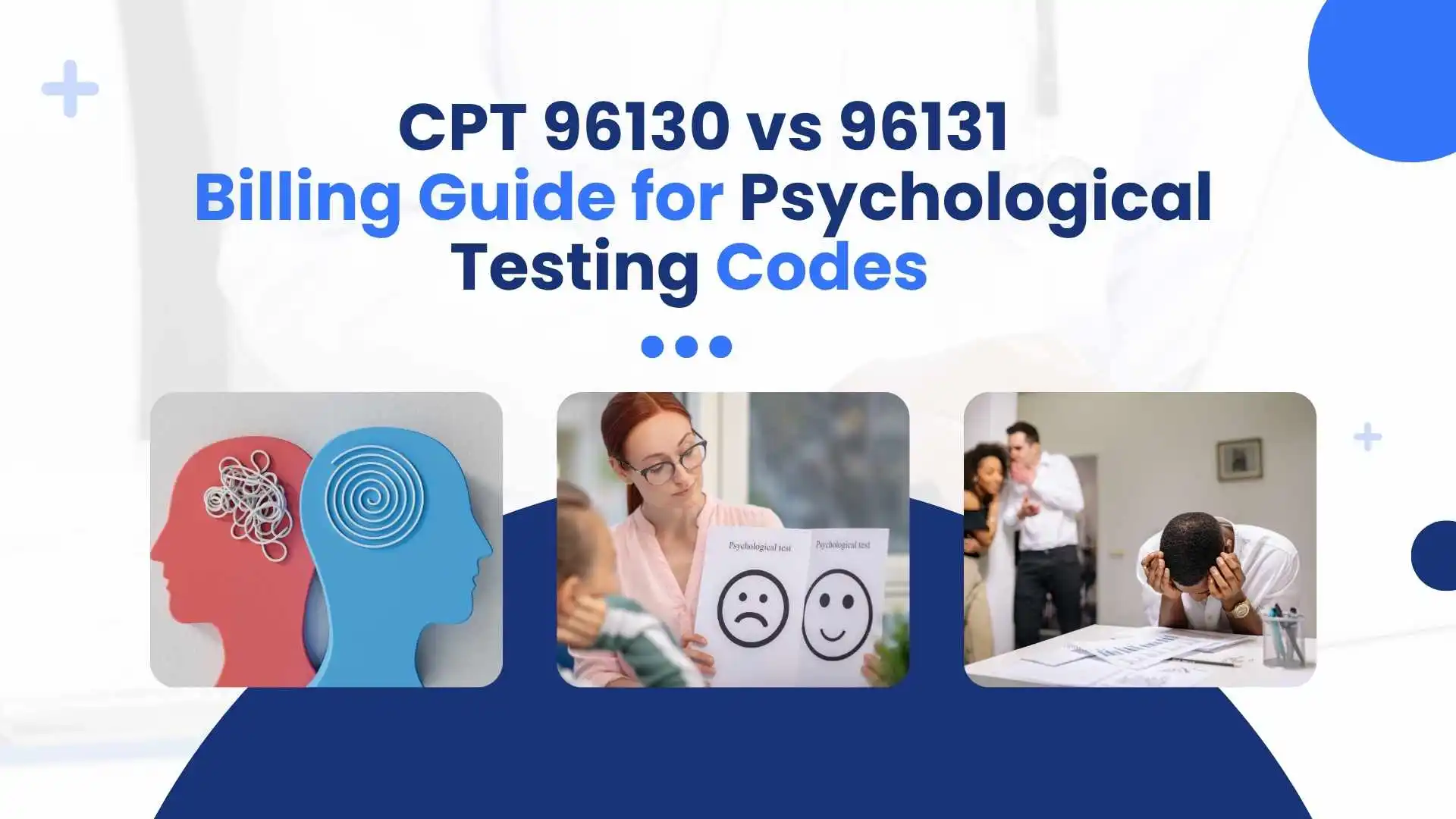In psychological or neuropsychological testing, knowing the 96130 vs 96131 is very important, especially if you are billing for these services. These two psychological evaluation CPT codes are often employed by clinicians to note the provision of psychological, emotional, and behavioral services. So, what is the difference between these two?
Our article is especially for you if you are responsible for psychiatry billing, mental health evaluations, or insurance claim coding. Here, we will explain the practical and technical distinctions of 96130 and 96131 and their relation to GAD (Generalized Anxiety Disorder), ADHD, PTSD, and other neurocognitive disorders. It will help you work with the code without fear.
Overview of CPT Code 96130 and 96131
CPT 96130 is the first hour of psychological or neuropsychological testing evaluation conducted by a qualified healthcare professional (QHP). It includes interpreting tests, reviewing the patient history, clinical assessment, decision-making, feedback discussions, and drafting a formal document summarizing the evaluation.
On the other hand, CPT code 96131 is an add-on code used to bill for every extra hour after the first 60 minutes. It is important to know that 96131 cannot be billed on its own. It must follow a 96130 and is only applicable when the testing evaluation has surpassed one hour, which is quite common for intricate cases such as ADHD, PTSD, or cognitive assessment that need more time for thorough evaluation.
Time and Documentation Requirements
Because these are time-based CPT codes, correct time reporting is very important. As per the American Medical Association (AMA) Instructional Guidelines:
- 96130 has a minimum time of 31 minutes of evaluation service.
- 96131 can only be billed for each full hour above and beyond the first hour.
For example, a psychologist who conducts neurocognitive testing for a patient diagnosed with dementia that spans over two sessions and lasts for 2 hours and 30 minutes, would be able to bill
- 1 unit of 96130
- 2 units of 96131
Every time should be recorded in the patient record, and it should be billed on the last day of service. It is particularly vital in cases of detailed examinations, such as GAD-7 screening or CPT code ADHD, that can span over several visits.
Who Can Bill These Codes?
Only licensed clinical psychologists, psychiatrists, neurologists, and, in certain states, nurse practitioners are allowed to charge CPT codes 96130 and 96131. Some technicians can also perform testing, but they are not able to charge these codes. They preferably use more general codes, such as 96136 to 96139.
When they use standard testing devices, they carry CPT or HCPCS codes of their own, except when they are conducting it as part of a complete evaluation.
Make sure that the documentation and code are relevant to the clinical work.
Billing for Specific Diagnoses: GAD, PTSD, ADHD
Some of the disorders that most practitioners conduct psychological assessments on are as follows;
- The diagnosis code commonly used for billing Generalized Anxiety Disorder (GAD) is F41.1 or F41.9. However, when it needs a mental health assessment, then you may charge it as CPT 96130 or 96131.
- Post-Traumatic Stress Disorder (PTSD) – When the evaluation involves much testing, you can use CPT code for PTSD assessments for both 96130 and 9613.
- Attention Deficit Hyperactivity Disorder (ADHD) – Tests may involve tests of attention and behavior that can take several hours. This makes it okay to qualify under the CPT code ADHD combinations.
These types of services are associated with CPT codes for mental health, especially when they involve interpretation and psychometric evaluations.
A Quick Review of CPT 96130 vs 96131
To clarify the distinction between the two codes, here is a brief comparative table
| Feature | CPT 96130 | CPT 96131 |
| Purpose | First hour of psychological evaluation | Each additional hour beyond the first |
| Code Type | Stand-alone, primary code | Add-on code (must follow 96130) |
| Time Requirement | At least 31 minutes | Each additional full 60 minutes |
| Billing Personnel | Qualified Health Professionals only | Same as 96130 |
| Common Uses | GAD-7, ADHD, PTSD, dementia screening | Extended ADHD, neuropsych, or PTSD evaluations |
Neuropsychological vs Psychological Testing
One question people often ask is the difference between neuropsych and psych evaluations.
- Psychological evaluations (96130/96131) place emphasis on mood, behavior, personality, and mental health concerns.
- Neuropsychological testing has CPT options like 96130/96131, but tends to include more advanced assessments for brain injury, cognitive decline, recovery from stroke, or dementia assessment.
When billing for neuropsychological testing CPT code scenarios, ensure the relevant documentation includes cognitive domains such as memory, executive function, and processing speed so that standard psychological assessments do not overlap.
Before administering a full battery of psychological tests billed under CPT 96130 and 96131, many providers first conduct a neurobehavioral status exam to assess cognitive functioning, attention, and emotional status. For this purpose, CPT Code 96116 plays a vital role in establishing the baseline and medical necessity for further psychological testing.
Medicare and Neuropsych Testing
One of the most common inquiries is: Does Medicare cover neuropsychological tests? Yes. Medicare pays for CPT 96130 and 96131 if the tests are medically necessary. Justification for the testing often must include supporting diagnoses such as F41.9 (anxiety disorder), F84.0 (autism), or F90.0 (ADHD).
Estimated reimbursements for the year 2025 are expected to be approximately.
- 96130: $117–$132
- 96131: $84–$106
Due to their specific contract provisions, commercial insurance might reimburse at a slightly higher rate. Proper coding and documentation can secure your payment and reduce denials.
Tips for Accurate Psychiatry Billing
In psychological assessment and evaluation coding, never forget to:
- Track time perfectly, which should include both face-to-face time and non-face-to-face time, such as report writing.
- Only bill on the last day of service, regardless of how many sessions are scheduled over multiple dates.
- Apply proper modifiers, modifier 25 for E/M service or modifier 59 for distinct procedural service.
- Don’t bill CPT 96131 without 96130.
These tips are critical to mastering psychiatry billing codes while ensuring compliance.
Real-Life Example
Let us explore a real-life situation. For this, we take the example of a psychologist who is evaluating a patient suffering from anxiety. As part of the assessment, the psychologist performs a GAD-7 screening, followed by other tests. Over the course of two days, evaluation, interpretation, and feedback took a total of 2 hours and 45 minutes.
In this case:
- CPT 96130 is billed for the first hour.
- CPT 96131 is billed two times (for two hours).
- The diagnosis code F41.9 (anxiety disorder unspecified) is attached.
- Testing includes cognitive screens to rule out other issues, falling into the neurocognitive testing CPT codes.
The service is billed on the last day with exact time logs for both days.
Final Thoughts!
Knowing 96130 vs. 96131 is very beneficial for perfect billing and getting paid on time. Now that you know 96130 is for the first hour and 96131 is for every extra hour, you are better prepared to handle evaluations for GAD, ADHD, PTSD, and even neurocognitive disorders.
Our article makes the psychological testing CPT codes simple and clear. Whether doing a GAD-7 screening, a full psych assessment, or a neuropsych test, having this knowledge helps you stay organized, avoid errors, and feel confident in your billing.





